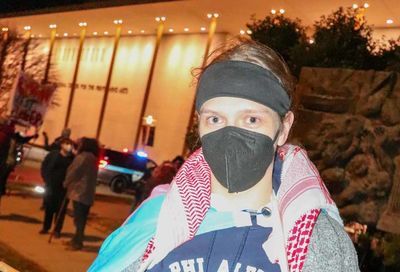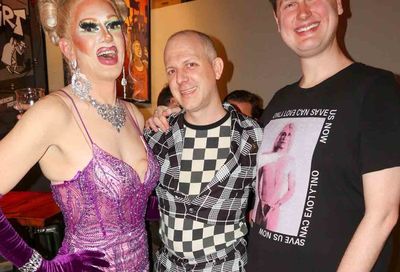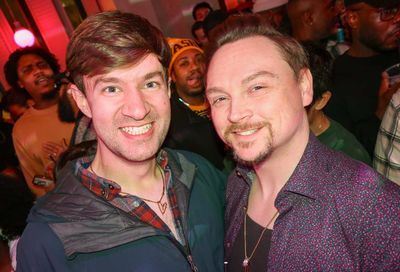Five reasons why Fantastic Beasts 2 doesn’t work
From queerbaiting to a stretched racism allegory, here's everything wrong with The Crimes of Grindelwald

Something has gone horribly wrong with Fantastic Beasts: The Crimes of Grindelwald, the latest entry in J.K. Rowling’s Fantastic Beasts franchise. Despite a wealth of ideas, phenomenal special effects, and several strong performances, what audiences have unfortunately ended up with is two boring hours of setup for the next three films still to come.
Two years ago, Fantastic Beasts and Where to Find Them introduced us to the world of Newt Scamander and his love of magical animals. Mixed into this was the rising threat of a powerful wizard, Grindelwald, and more world-traveling magical action than we were treated to in the mostly Hogwarts-set Harry Potter franchise. It was a promising start, and an intriguing way of bringing audiences back into the Potter universe.
Hopes were high going into Crimes of Grindelwald, and to the film’s credit, it does get some things right. The 1920s setting, in particular, continues to delight with a mix of period characters and locales, particularly when they cross paths with historical elements from the Potter franchise. And the international focus has given audiences glimpses of wizarding life outside of the British Isles, with Grindelwald shifting the action from the streets of New York to the boulevards of Paris.
Despite its positives, however, not even die-hard Harry Potter fans are likely to leave the theater feeling they got their money’s worth. With that in mind, we’ve gathered our five biggest peeves with Crimes of Grindelwald, from repetitive narrative structure to a distinct lack of sexuality. (Consider this our spoiler warning for those who haven’t yet seen the film.)
Harry Potter 2.0
One of the most exciting aspects of this second film was the introduction of a much younger Albus Dumbledore, here played with wit and depth by a suitably sure-of-himself Jude Law. While Law’s interpretation of Dumbledore, shown as a Defense Against the Dark Arts teacher in Hogwarts, is one of Grindelwald‘s highlights, the narrative Rowling has placed him at the center of is almost stupidly facile and derivative.
Far from becoming a franchise about magical creatures and Newt’s attempts to save and rehome them, Fantastic Beasts is instead setting itself up to be a 1920s retelling of the young, pure-of-heart wizard versus powerful, murderous, older wizard story that we witnessed in the main Potter franchise.
What’s most egregious about this, other than it squandering an opportunity to tell a different sort of tale in this more beast-focused world, is that Dumbledore is once again introduced as the older father figure telling a young wizard that he must destroy the world’s “big bad.” Much like Harry was the one coerced into battling Voldemort, Newt is told that he must be the one to take the fight to Grindelwald, not Dumbledore.
“I cannot move against Grindelwald,” Dumbledore tells Newt. “It has to be you.”
It’s basically a two-sentence version of the seven books’ worth of conversations that Dumbledore had with Harry.
Dumbledore eventually gives a reason for once again making a younger guy do his bidding, but that brings us onto our second point….
Queerbaiting
J.K Rowling made much in 2007 of the fact that Dumbledore, a central character throughout the Potter books, was gay — despite never once providing narrative evidence of this fact.
We were then told that in Grindelwald, a younger Dumbledore would be shown as gay — though director David Yates then corrected that to say he wouldn’t be “explicitly” gay. As it transpires, he wasn’t wrong.
Dumbledore’s sexuality is referenced twice. In one scene, a Ministry of Magic official states that Dumbledore and Grindelwald (a quietly menacing Johnny Depp) were “as close as brothers” — prior to Grindelwald’s whole fascist uprising, that is. Dumbledore corrects him, saying they were “much closer than that.”

The second scene relies on in-depth knowledge of the Potter franchise. Dumbledore stands in front of the Mirror of Erised, which shows its subject their greatest desire. Dumbledore sees Grindelwald, floating ethereally behind him. However, unless you know what the Mirror of Erised is — because it’s never actually mentioned in this film — the significance of the vision will completely pass viewers by.
It’s possible that Warner Bros. chose to keep any explicit representations of Dumbledore’s sexuality out of the film to prevent conservative backlash or boycotts in countries with anti-LGBTQ laws/attitudes. But for LGBTQ viewers, it’s a cheap way of representing a gay character on screen (and let’s not even get into the fact that the only other gay/bisexual character, Grindelwald, is the wizarding equivalent of Hitler).
Unbelievable Credence
One of the most bizarre plot details in Grindelwald is that Credence Barebone (Ezra Miller) is alive, well, and still a powerful, Obscurus-toting wizard. That may surprise anyone who saw the first film, as it ended with Credence being blown to smithereens by American magical officials.
The reason given for his inexplicable survival? “He survived,” Newt is told. That’s it. Two words.
It’s not just lazy writing on Rowling’s part, but also the result of a filmmaking decision. A scene showing Credence having survived the blast was to be included at the end of the first film — the reason being that a tiny fragment of his Obscurus escaped the onslaught — but it was cut, apparently to avoid making too obvious a point of his importance.
Unfortunately, all it does is make Grindelwald seem sloppier. And if a character can survive the magical equivalent of having TNT thrown at them, why should we care when anyone else dies through a means other than the Avada Kedavra curse?
Stretched Allegories
One of the more awkward aspects of Grindelwald is how far Rowling is stretching her magical/non-magical racism allegory. Witches and wizards with two magical parents are “purebloods” while those with split parentage are “mudbloods.” As for non-magical people, or Muggles/No-Majs, they’re considered inferior by certain sects of the wizarding community. This is all something previously established in the Potter books.
In Grindelwald, the relationship between witch Queenie and No-Maj Jacob stops becoming a charming plot point and instead is used to repeatedly beat audiences over the head, as Rowling’s script shouts, “THIS IS ABOUT INTERRACIAL MARRIAGES.”
We get it, J.K., their love is illegal because magical Americans were just as backwards as racist, segregating non-magical folk (Europe, we’re told, has no such ban on magical/non-magical marriages).
But things become all the more ludicrous when Queenie falls prey to Grindelwald’s charms. This is a character who refers to non-magical people as “beasts of burden” and speaks of their inferiority — heck, he even commands one of his followers to murder a non-magical baby after they slaughtered his parents, because why let him live if he’s not a wizard?

Naturally, in public, our pseudo-Hitler charms audiences by telling them he wants the wizarding community to be free to live as they want. He states he doesn’t hate non-magical people, but that they are “different” to wizards, and serve a different purpose. And, of course, the people who flock to his rally believe him.
rQueenie thinks this guy, who is like a parody of a white supremacist with his almost translucent skin and white hair/eyebrows, is going to support her right to marry Jacob. Sure, that makes complete sense.
We get that Rowling is trying to show how easily the average person can be swept up in such movements, but if you aren’t rolling your eyes at this point, we’d be surprised.
Where the Wild Things Aren’t
In a film that has the words “fantastic beasts” in its title, it’s somewhat remarkable that the animals are essentially relegated to guest star status in this second outing.
Pick the Bowtruckle makes a return, as does the slapstick humor of the shiny object-loving Niffler, but apart from a couple of dazzling scenes featuring a giant, feline-esque, Chinese-inspired Zouwu, there’s a distinct lack of creatures.
What’s worse is that arguably some of Grindelwald‘s best moments happen when there’s animals involved — take the opening, where Newt tends to the creatures in his TARDIS-like basement, which has been magically altered like his suitcase to home beasts in spaces many times their normal dimensions. Not only is it dazzling in its artistry and wonderment, there’s a humor and warmth to these interactions, both between Newt and Bunty, his assistant, and Newt and his animals.
After the first film, Fantastic Beasts seemed to be a franchise that would focus on Newt and his animal-gathering adventures, set against the backdrop of a wizarding world poised for war. It’s why the Harry Potter books and films were so successful — despite everything that was happening in the outside world, each successive installment was anchored by the need for the characters to go back to school every year. Voldemort was always there, always in the background, but the main plot moved forward through each school year.
Grindelwald eschews Newt’s cataloguing of animals to instead throw him into the fight between good and evil, light and dark, Jude Law and Johnny Depp, but without the animals and his day-to-day work to keep the wheels of this second film turning.
Instead, what we have is two hours of exposition, as Rowling churns through a ludicrous number of details to set in place the plot points for the next film — and two more after that.
Bring back the beasts, J.K. We’ll all be better for it.
Support Metro Weekly’s Journalism
These are challenging times for news organizations. And yet it’s crucial we stay active and provide vital resources and information to both our local readers and the world. So won’t you please take a moment and consider supporting Metro Weekly with a membership? For as little as $5 a month, you can help ensure Metro Weekly magazine and MetroWeekly.com remain free, viable resources as we provide the best, most diverse, culturally-resonant LGBTQ coverage in both the D.C. region and around the world. Memberships come with exclusive perks and discounts, your own personal digital delivery of each week’s magazine (and an archive), access to our Member's Lounge when it launches this fall, and exclusive members-only items like Metro Weekly Membership Mugs and Tote Bags! Check out all our membership levels here and please join us today!























You must be logged in to post a comment.